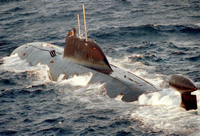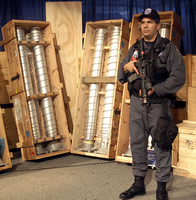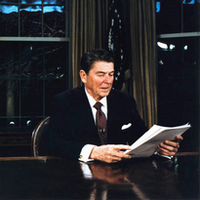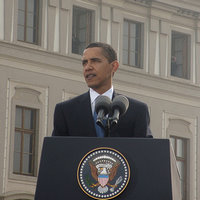Recently, Poland and Russia have been having a little dust up over the Ribbentrop-Molotov Pact, in anticipation of tomorrow’s 70th anniversary of the Nazi invasion of Poland. To calm things down, Russian Prime Minister Vladimir Putin penned a piece for the Polish daily, Gazeta, addressing himself to the Polish people. It’s a conciliatory appeal that seeks to address Polish sensitivities while using pre-WWII Great Power maneuverings to argue for Russia’s place in the European security architecture. And it illustrates what I meant earlier when I said that the Poles stand to gain from a more cooperative atmosphere between Russia and […]
Europe Archive
Free Newsletter
Should the reports of a relocation of European-based missile defense prove true, expect to hear a lot more along the lines of this coming out of Eastern Europe, from the NY Times article: “It is clear that Eastern Europe is out of the epicenter of thisAmerican administration,” said Piotr Paszkowski, a spokesman forPoland’s foreign minister. Just keep in mind that driving the aggrieved laments, of course, is not so much a profound sense of abandonment or betrayal, but rather profound concerns over money. Poland is in the midst of a major and sorely needed defense modernization, reflecting its increasing ambitions […]
Smartest thing I’ve read on NATO’s future strategic mission, not surprisingly by Zbigniew Brzezinski (via Thomas P.M. Barnett). A longer version of the essay also appears in the new issue of Foreign Affairs. Essentially, NATO uses partnerships with other regional security organizations (CSTO, SCO) to participate in out-of-region security challenges, thereby avoiding gathering mothballs in Europe. The added advantage is that it reduces Russian and Chinese anxiety over NATO encroaching into their neighborhoods when the need — or desire, in the case of Georgia and/or Ukraine — arises. It also allows for NATO involvement in regional security solutions in the […]
In August 2008, Russia and Georgia fought a brief, bloody war over Georgia’s pro-Russian region of South Ossetia. After hundreds of casualties, Georgia withdrew its forces, essentially ceding the breakaway province to Russia. Moscow’s overall aim was to ensure “that Russia’s power is respected both within and outside the post-Soviet space,” according to U.S. Army Lt. Col. Robert Hamilton, a fellow at the Washington-based Center for Strategic and International Studies. While the bulk of the fighting in South Ossetia pitted tanks against tanks and infantry against infantry, the conflict also featured sophisticated propaganda efforts, on both sides. Russian and Georgian […]

The U.S. Cyber-Consequences Unit has recently issued a report documenting how Russia supplemented its conventional war against Georgia last August with a massive, well-integrated and pre-planned information warfare campaign against Georgia’s Internet structure. The techniques were so successful that the unit has restricted distribution of the full report to U.S. government and certain other Internet security professionals. Only the executive summary (pdf) has been made available to the public. The U.S. Cyber-Consequences Unit is independent, non-profit research institute affiliated with the Fletcher School of Law and Diplomacy at Tufts University. The report’s main author, John Bumgarner, directs research at the […]
Get a .pdf version of this report. Since gaining its independence from the Soviet Union, Poland has looked to play an active role in the regional security environment. Two interrelated foreign policy spheres preoccupy Polish policymakers. First is the country’s Atlanticism, incorporating NATO membership and a close relationship with the United States. Second is the country’s European Union membership. Since having successfully acceded to NATO (1999) and the EU (2004), Poland has been expected to take up its share of the security and defense burden. In consideration of its new security responsibilities, the Polish armed forces as well as Polish […]

Editor’s Note: The following is a letter to the World Politics Review editor from Simon Shercliff, first secretary for foreign security and policy at the British Embassy in Washington. To the Editor: It’s important that I set the record straight on David Axe’s World Politics Review column entitled “Afghanistan Could Portend British Pull-out” and his subsequent and related blog post on Wired’s Danger Room, both of which wrongly argued that the 200th British soldier killed last week in Afghanistan could potentially weaken the U.K.’s resolve and long-term commitment to Afghanistan. No one can doubt the U.K.’s commitment to this mission. […]
Over at the Columbia Journalism Review, I have a quick rundown of the continuing American media war between Georgia and Russia. But there is something I left out, and it speaks to how we can try to make sense of global events: opinion journalism. In this Great Newsmedia Contraction we’re all puzzling our way through, most news agencies have either removed or severely constrained their foreign bureaux. As a result, there are far fewer reporters covering global hot spots — both print and TV. A few years back, in 2007, well before the current crisis point newspapers have hit, the […]
The international rights community is pressuring Russian authorities to end a bloody campaign against journalists, activists and aid workers in Chechnya, following the grisly discovery of activists Zarema Sadulayeva and her husband Alik Dzhabrailov shot dead in the trunk of a car Tuesday morning in Grozny. “The international community must wake up to the fact that the systematic and continuing failure of the authorities in the Russian Federation and the Chechen Republic to investigate effectively the murders of human rights activists or indeed any other human rights violations that have taken place over the past years is a strong indication […]

The American defense community has properly reacted with nonchalance to the appearance of two Russian nuclear-powered submarines off the U.S. East Coast. Neither the submarines nor the rest of the Russian Navy presently represent a major threat to the United States. In a formal statement, the U.S. Northern Command confirmed the subs’ unusual presence, but pointed out they remained outside U.S. territorial waters and engaged in legally permissible transit and other non-threatening activities. Pentagon spokesman Geoff Morrell later explained that, “So long as they are operating in international waters, as, frankly, we do around the world, and are behaving in […]
The news about the Russian attack subs patrolling international waters off the Eastern Seaboard is not so much that they’re there. And it’s definitely not that there’s anything necessarily worrisome about them being there. The real news is that the news was leaked at all. And I suspect that had to do with letting the Kremlin know that we were wise to them all along. According to a Russian intelligence source cited by RIA Novosti, a sub-based Russian missile launch in the Arctic Ocean in July caught the Pentagon off-guard. If true, yesterday’s leak would be a way to let […]
Anyone wondering what the Kyrgyz giveback to Russia would be for extending the U.S. lease at Manas didn’t have to wait long. That base is getting costly, especially since the logic for it ends with the operations in Afghanistan, whereas whatever concessions the Russians get in Kyrgyzstan are likely to have a lot more staying power.
I didn’t see a whole lot new, other than the name of NATO’s secretary general, in this Steven Erlanger interview with Anders Fogh Rasmussen. Afghanistan and Russia are still the alliance’s top priorities, Europe still needs to do more for the former, and the alliance’s rhetoric still doesn’t quite match up to the status quo on the latter. This did catch my eye, though, in response to a question about France’s reintegration of the alliance’s military command: “The French decision has removed a lot of suspicion internally”within NATO, he said. “It opens big and interesting perspectives fortrans-Atlantic relations and the […]

President Barack Obama’s praiseworthy effort to establish a bipartisan national security team, epitomized by his decision to maintain Robert Gates as secretary of defense, continued with his and Gates’ appointment of Kenneth A. Myers III as the new director of the Defense Threat Reduction Agency (DTRA). Myers previously worked on the personal staff of Sen. Richard Lugar, who himself has a long history of reaching across the aisle to build bipartisan coalitions on behalf of various national security initiatives. Along with then-Sen. Sam Nunn, Lugar helped launch the Cooperative Threat Reduction (CTR) Program at the Defense Department in 1991. In […]

U.S.-Russian Nuclear Arms Control under Obama and Medvedev Since assuming office in late January 2009, President Barack Obama and his senior foreign policy advisers have resurrected the traditional approach toward Russian-American strategic arms control negotiations pursued by U.S. administrations during the 1990s. After an initial internal review and successful talks between Secretary of State Hillary Clinton and Russian Foreign Minister Sergey Lavrov in Geneva on March 6, the Obama administration decided to attempt to negotiate a new strategic arms control agreement before the existing START accord expires on Dec. 5, 2009. At their July 6-7 summit in Moscow, Obama and […]

An Alternative to Arms Control Every Washington wonk dreams that a new president will pick up his or her agenda. When it comes to advocates for nuclear arms control, that dream seems to be coming true. On the editorial pages of the Wall Street Journal in January 2007, George Shultz, William Perry, Henry Kissinger and Sam Nunn voiced a clarion call for the “road to zero,” urging other former high-level officials from countries around the world to join them in pushing for the global abolition of nuclear weapons. The following year, only months before the presidential election, George Perkovich and […]

While headlines focus increasingly on President Barack Obama’s responses to the nuclear programs of North Korea, Iran, and Pakistan, the new administration has been quietly investing a substantial amount of diplomatic time and capital in a somewhat obscure meeting that nevertheless could have significant implications for Obama’s nonproliferation agenda. The meeting, which will take place at the United Nations nearly a year from now, is the latest in a regularly scheduled series of gatherings of signatory states to review the nuclear Nonproliferation Treaty. To a significant degree, the Obama administration’s posture to date on a variety of nonproliferation issues has […]
